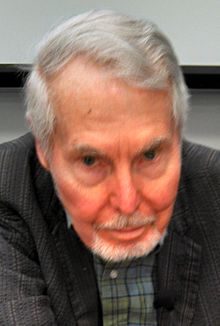John David Jackson (physicist)
| John David Jackson | |
|---|---|

Jackson autographing a copy of his classical electrodynamics textbook
|
|
| Born |
January 19, 1925 London, Ontario, Canada |
| Died | May 20, 2016 (aged 91) Lansing, Michigan, U.S. |
| Nationality | Canadian American |
| Fields | Physics |
| Institutions |
MIT McGill University University of Illinois University of California, Berkeley Lawrence Berkeley National Laboratory |
| Alma mater |
University of Western Ontario MIT |
| Doctoral advisor | Victor Frederick Weisskopf |
| Doctoral students |
Gordon L. Kane Chris Quigg |
| Notable awards | Hon. D.Sc., University of Western Ontario, 1989 |
John David Jackson (January 19, 1925 – May 20, 2016) was a Canadian–American physics professor emeritus at the University of California, Berkeley and a faculty senior scientist emeritus at Lawrence Berkeley National Laboratory. A theoretical physicist, he was a member of the National Academy of Sciences, and is well known for numerous publications and summer-school lectures in nuclear and particle physics, as well as his widely used graduate text on classical electromagnetism. The book is notorious for the difficulty of its problems, and its tendency to treat non-obvious conclusions as self-evident. Jackson's high standards and admonitory vocabulary are the subject of an amusing memorial volume by his son Ian Jackson.
Born in London, Ontario, Canada, Jackson attended the University of Western Ontario, receiving a B.Sc. in honors physics and mathematics in 1946. He went on to graduate study at MIT, where he worked under Victor Frederick Weisskopf, completing his Ph.D. thesis in 1949.
Jackson held academic appointments successively at McGill University, thanks to Philip Russell Wallace, a prominent Canadian theoretical physicist, (January 1950 – 1957); then the University of Illinois at Urbana–Champaign (1957–1967); and finally the University of California, Berkeley (1967–). At McGill, he was Assistant and Associate Professor of Mathematics; at Illinois and Berkeley, he was in the Physics Departments. At the latter, he held appointments on campus and at the Lawrence Berkeley National Laboratory. Since retiring from teaching at the beginning of 1993, he has continued to be active at LBNL.
...
Wikipedia
